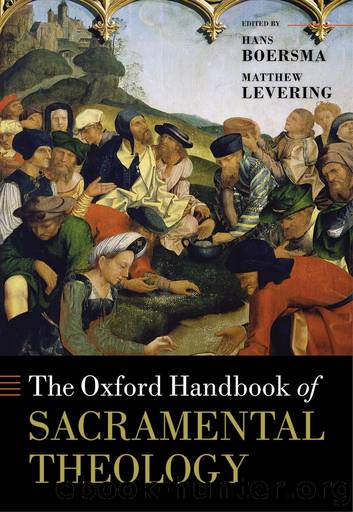The Oxford Handbook of Sacramental Theology by Hans Boersma

Author:Hans Boersma
Language: eng
Format: epub
Publisher: OUP Oxford
Published: 2015-11-15T00:00:00+00:00
ROBERT DALY, S.J., ON SO-CALLED âDESTRUCTIONâ THEORIES
Daly faults these theologians on three points: (1) a ânarrowâ interpretation of the axiom in persona Christi that âeliminatesâ an ecclesiological interpretation in favor of a Christological interpretation; (2) an over-emphasis on the words of institution at the expense of other aspects of the Eucharistic Prayer and accompanying ritual; and (3) an interpretation of eucharistic âactionâ whose dynamic is expressed as a movement from Christ to the priest to the church (rather than from Christ to the church to the priest), which Daly believes leads to an over-emphasis on âpriestly power, position and privilege against which many have protestedâ (Daly 2000: 240). Although Daly concedes that Lumen gentium (n. 10) and Sacrosanctum concilium (n. 48) seem to conform to the earlier tradition of Bellarmine that was taken up by the Magisterium, he believes the force of this tradition weakened by Paul VIâs addition of the epiclesis in the 1969 Missale Romanum. Although Paul VI left the âtraditional Western overemphasisâ on Jesusâ words of institution intact, Daly believes that the addition of the explicit epiclesis warrants the discarding of the traditional scholastic notion that the words of institution are the âessential formâ of the sacrament. To justify this sweeping change, he appeals to Kilmartin, who lays the blame for the âmodern average Catholic theology of the Eucharistâ on post-Tridentine theologians, who sought to find the visible sacrifice of the Mass in the separate consecration of the elements and proposed a âmystical mactationâ of Christ at the level of sacramental signs. âThus,â Kilmartin says, âthey espoused the idea of a sacrificial rite, the structure of which was the sacrifice of the self-offering of Christ in the signs of the food. This is a pre-Christian concept which is now generally discarded in current Catholic theologyâ (Kilmartin 1998: 294â295). In fact, according to Daly, the scholastic tradition exemplified by John Paul IIâs Dominicae cenae âreflects the same kind of confusion as that caused by Trent when it used offerre to refer both to the historical sacrifice of the cross and to the phenomenological, history-of-religions liturgical-ritual sacrificial act of the eucharistic celebration, not attending to the fact that sacrifice, in the history-of-religions sense of the word, had been done away with by the Christ eventâ (Daly 2000: 245). In this confusion, the baroque tradition that stretches from the sixteenth century to John Paul II ultimately neglects the Eucharistâs Trinitarian dimensions, its ecclesiological perspective, and its eschatological goal.
Whether they realize it or not, Kilmartin and Daly unwittingly find themselves at the end of a long line of Protestant critics of late medieval and post-Tridentine eucharistic theology. Although its roots sink deeper into older Lutheran histories of philosophy and theology, the modern critique is best known in the Anglican genealogy that purports to unmask the persistence of âmedieval errorsâ in post-Tridentine sacramental theology that begins with A. W. Haddanâs Apostolic Succession in the Church of England (Haddan 1869), finds its most influential form in B. J. Kiddâs The Later Mediaeval Doctrine
Download
This site does not store any files on its server. We only index and link to content provided by other sites. Please contact the content providers to delete copyright contents if any and email us, we'll remove relevant links or contents immediately.
Christian Ethics by Wilkens Steve;(854)
Christian Ethics for a Digital Society by Kate Ott(774)
Fearfully and Wonderfully Made by Philip Yancey & Paul Brand(755)
God and the Multiverse by Victor J. Stenger(667)
Numbers by Ronald B. Allen(629)
How to Read Slowly by James W. Sire(608)
Christian Ethics: An Introduction to Biblical Moral Reasoning by Wayne Grudem(589)
The City of God by Saint Augustine & Marcus Dods(565)
Morality by Jonathan Sacks(564)
Monastic Archaeology by Unknown(558)
The Technological System by Jacques Ellul(542)
Amish Grace by Donald B. Kraybill & Nolt Steven M. & Weaver-Zercher David L(521)
The Disabled Church by Rebecca F. Spurrier;(516)
Jesus: A New Vision by Whitley Strieber(516)
Death of the Doctor by Unknown(512)
Children of Lucifer; The Origins of Modern Religious Satanism by Ruben van Luijk(503)
Critical Writings by Joyce James;(499)
Redeeming Sociology by Vern S. Poythress(476)
The Church in the Early Middle Ages by G.R. Evans(464)
